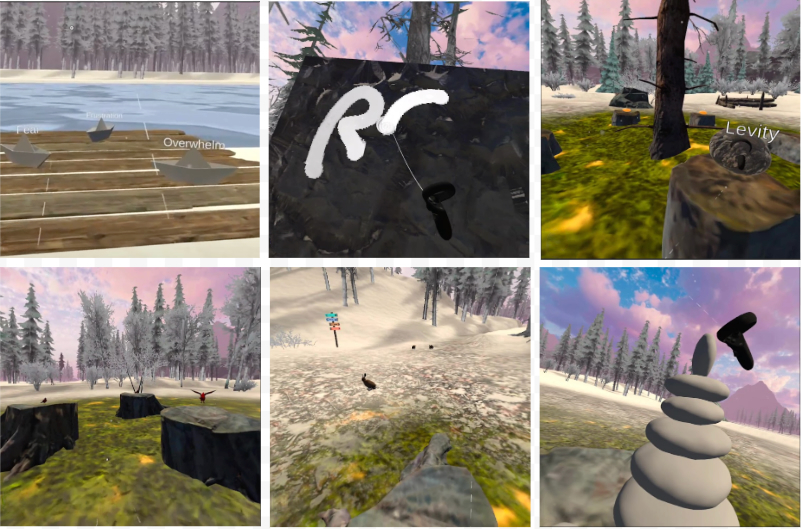R03 – Design, Development, and Testing of a Virtual Relaxation Environment to Reduce Stress in Teens (RESeT)

Principal Investigators
Elin Björling, PhD, Research Scientist/Lecturer, Human Centered Design and Engineering
Jennifer Sonney, PhD, Assistant Professor, Department of Family and Child Nursing
Project Description
Adolescents are the most stressed generation, with almost a third of teens reporting very high levels of daily stress. Chronic stress is associated with adverse physiological (e.g., immune dysregulation, obesity) and psychological (e.g., anxiety, depression) health outcomes and negatively impacts learning and memory. For many students, school is the only access point for mental health services, but accessible and scalable stress interventions for teens are lacking or too costly for schools to implement. Mindfulness-Based Interventions (MBI) have demonstrated efficacy in improving self-regulation and stress-related health outcomes, and virtual reality (VR) holds promise as a self-administered, immersive platform to deliver mindfulness interventions. Therefore, development of a school-based, self-administered mindfulness intervention is an ideal solution to support vulnerable adolescents by reducing their stress.
| Setting | School-based environments |
| Population | Adolescents experiencing high levels of daily stress |
Intervention and/or Implementation Strategy Designed or Redesigned
Impact
This project aligns with the UW ALACRITY mission by: (1) proposing a novel adaptation to an evidence-based intervention and (2) engaging a multidisciplinary team including end-users to (3) address a critical health problem (teen stress). The development of RESeT will provide an accessible and scalable stress intervention that can be implemented in schools, potentially reaching vulnerable adolescents who would otherwise lack access to mental health services and supporting improved self-regulation and stress-related health outcomes.
Project Publications
Using Virtual Reality to Reduce Stress in Adolescents: Mixed Methods Usability Study
JMIR XR and Spatial Computing 1(2024) · Publisher
Authors
Elin A Björling, Jennifer Sonney, Himanshu Zade, Sofia Rodriguez, Michael D Pullmann, Soo Hyun Moon
Abstract
Background: Adolescent mental health is a national mental health emergency amid surging rates of anxiety and depression. Given the scarcity and lack of scalable mental health services, the use of self-administered, evidence-based technologies to support adolescent mental health is both timely and imperative.
Objective: The goal of this study was 2-fold: (1) to determine the feasibility, usability, and engagement of a participatory designed, nature-based virtual reality (VR) environment and (2) to determine the preliminary outcomes of our self-administered VR environment on depression, mindfulness, perceived stress, and momentary stress and mood.
Methods: We conducted a within-person, 3-week, in-home study with a community-based sample of 44 adolescents. Participants completed surveys of perceived stress, depression, cognitive fusion, and mindfulness at intake, postintervention, and a 3-week follow-up. Participants were invited to use a nature-based, VR environment that included 6 evidence-based activities 3 to 5 times per week. They completed momentary stress and mood surveys 5 times each day and before and after each VR session. Postintervention, participants completed surveys on system and intervention usability and their experiences with using the VR system. Quantitative data were analyzed using descriptive statistics and mixed effects modeling to explore the effect of the VR environment on stress. Qualitative data were analyzed using collaborative thematic analysis.
Results: Participants’ use of the VR environment ranged from 1 session to 24 sessions (mean 6.27 sessions) at home over a 3-week period. The 44 participants completed all study protocols, indicating our protocol was feasible and the VR environment was engaging for most. Both the use of the VR system and novel VR intervention received strong usability ratings (mean 74.87 on the System Usability Scale). Most teens indicated that they found the tool to be easily administered, relaxing, and helpful with stress. For some, it offered space to process difficult emotions. The themes calm, regulating, and forget about everything resulted from open-ended exit interview data. Although the Relaxation Environment for Stress in Teens (RESeT) did not significantly affect repeated survey measurements of depression, mindfulness, nor cognitive fusion, it did positively affect momentary mood (pre-intervention: 10.8, post-intervention: 12.0, P=.001) and decrease momentary stress (pre-intervention: 37.9, post-intervention: 20.6, P=.001). We found a significant reduction in within-day momentary stress that strengthened with increased VR use over time during the study period (P=.03).
Conclusions: These preliminary data inform our own VR environment design but also provide evidence of the potential for self-administered VR as a promising tool to support adolescent mental health. Self-administered VR for mental health may be an effective intervention for reducing adolescent stress. However, understanding barriers (including disengagement) to using VR, as well as further encouraging participatory design with teens, may be imperative to the success of future mental health interventions.
Pivoting to “No Contact”: A Protocol for Conducting a Virtual Reality Relaxation Home Study for Teens Amidst the COVID-19 Pandemic
Journal of Pediatric Health Care 35(5): 2021 · Pubmed · Publisher
Authors
Jennifer Sonney, Elin A Björling, Sofia Rodriguez, Nora Carr
Abstract
Prior to the COVID-19 pandemic, our team planned to pilot a self-administered virtual reality environment for stress reduction. The purpose of this manuscript is to describe our pivot to a “no contact” protocol, including participant feedback and lessons learned. Our protocol included virtual reality study kit sanitization, delivery, and return; remote screening, consent, enrollment, and data collection; and virtual study visits. All study participants found the protocol to be acceptable. Lessons learned include strategies for institutional review board approval and improved orientation to the study technology. Despite a global pandemic, our “no contact” protocol was feasible and acceptable.
